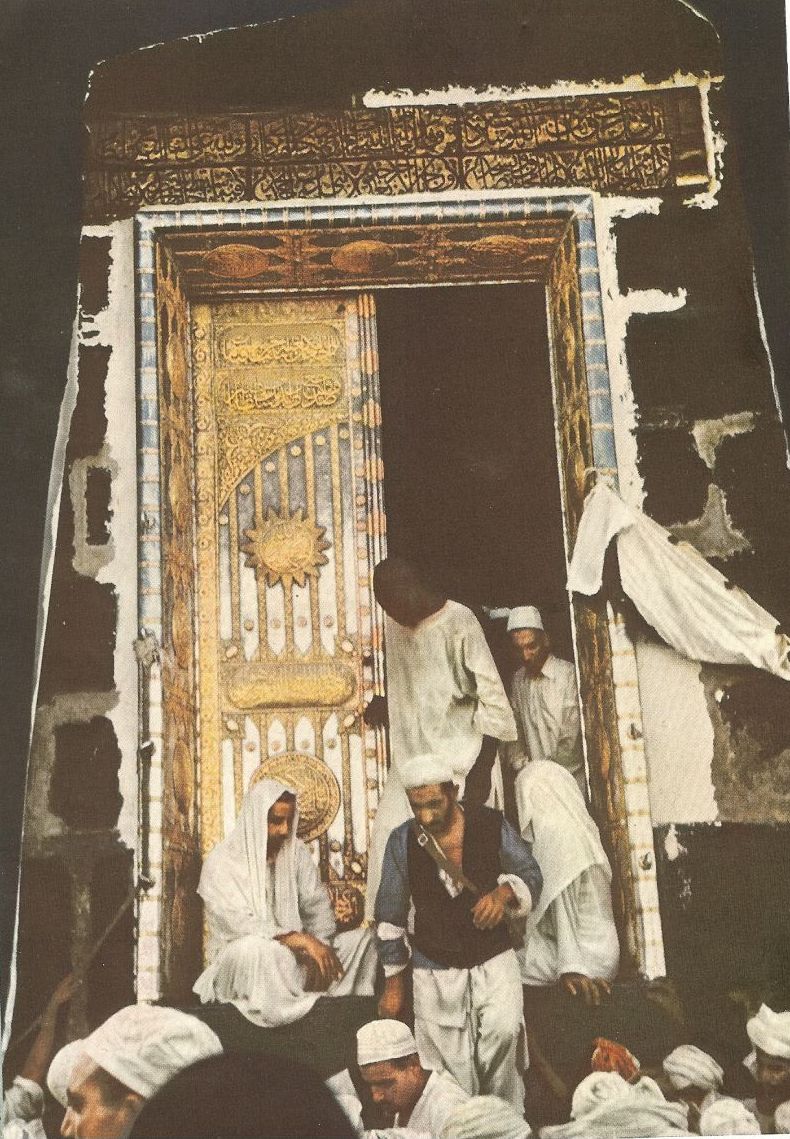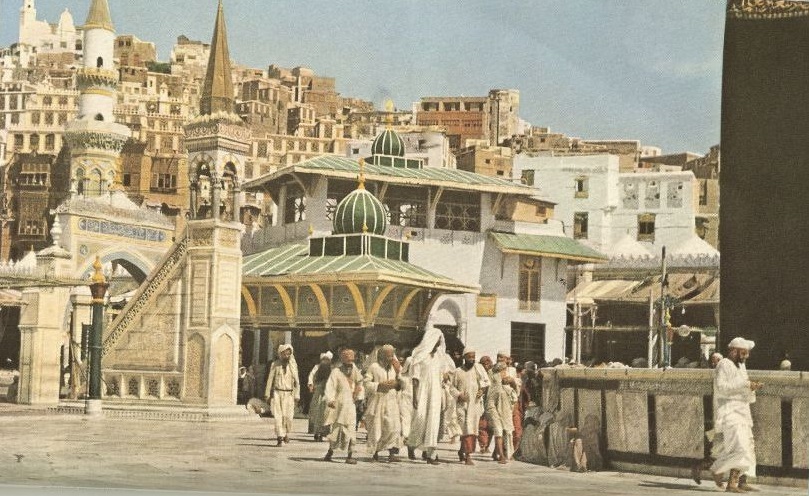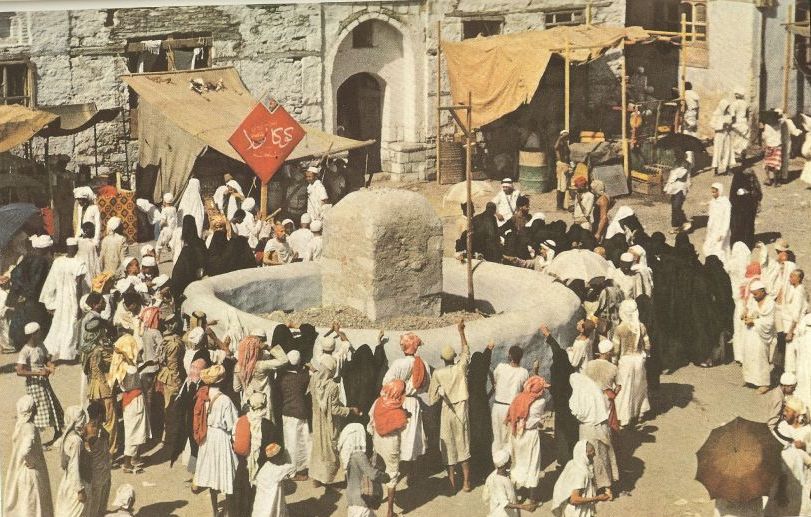
By the Break of Day; By the Ten Nights; By the Even and Odd (contrasted); And by the Night when it passes away; Is there (not) in these an adjuration (or evidence) for those who understand? (Surah al-Fajr 89:1-5)
“And proclaim the Pilgrimage among people; they will come to thee on foot and (mounted) on every kind of camel, lean on account of journeys through deep and distant mountain highways. That they may witness the benefits (provided) for them, and celebrate the name of Allah, through the Days Appointed, over the cattle which He has provided for them (for sacrifice). So eat you thereof and feed the distressed ones in want. Then let them complete the rites prescribed for them, perform their vows, and (again) circumambulate the Ancient House.” (Surah al-Hajj 22:27-29)
The first House (of worship) appointed for people, was that at Bakkah; full of blessing and of guidance for all beings. In it are Signs manifest; the Station of Abraham; whoever enters it attains security; pilgrimage thereto is a duty men owe to Allah, those who can afford the journey; but if any deny faith, Allah stands not in need of any of His creatures. (Surah Al ‘Imran 3:96-97)
We will be entering the month of Dhul Hijjah next week. The first ten days of Dhul Hijjah are the most sacred days of the year. They are mentioned as special days in Surah al-Fajr. These are the days of special blessings. Muslims are urged to do more Dhikr, charity and good deeds during this time. Fasting in these days is prescribed as Nafl from first to the ninth day of Dhul Hijjah. The Prophet -peace be upon him- said:
“There are no days in which righteous deeds are more beloved to Allah than these ten days.” The people asked, “Not even Jihad for the sake of Allah?” He said, “Not even Jihad for the sake of Allah, except in the case of a man who went out to fight, giving himself and his wealth up for the cause, and came back with nothing.” (Reported by Al-Tirmidhi 688)
At this time millions of Muslims are gathering in and around the sacred city of Makkah. They are coming from every corner of the globe to perform the sacred rites of Hajj. Many members of our own community are there. We pray to Allah to bless all Muslims and accept their Hajj and devotions.
Hajj is an important rukn of Islam. It has many benefits. It is a command of Allah. It is obligatory once in life on every adult Muslim male or female who can afford it physically and financially. Muslims perform Hajj every year in millions in number. They go there with great love and devotion.
Hajj has a form and a spirit. Its form is to have Ihram, perform Tawaf and Sa’y, go to Mina, ‘Arafat, Muzdalifah, do the ramy at the Jamarat and make sacrifice of a sheep, goat or camel. There are detailed rules that Pilgrims learn. Here at this time, however, I want to discuss a few points about the spirit of Hajj for our benefit and let us think about it in these days. This will help us here also.
1. Hajj is a ceremony of love and devotion to Allah. A Muslim’s relation with Allah is that of deep love, devotion and obedience. We love Allah, because He loves us. “He loves them and they love Him …” (al-Ma’idah 5:54). Prophet Ibrahim -peace be upon him- loved Allah and Allah took him as a Friend (Khalil). “Allah took Ibrahim as a friend .” (al-Nisa’ 4:125). Hajj is deeply associated with Prophet Ibrahim and his life-story. Hajj gives us a sense of History. Our faith is deep rooted in History. This is the religion of Allah given to us by His many prophets: Adam, Noah, Ibrahim, Ismael and finally Prophet Muhammad -peace be upon them all. These were the people who loved Allah and Allah loved them and made them the guides of humanity.
2. Hajj gives the universal spirit of Islam. People of all races, colors and nationalities go there. They become one people without any class or distinction. They look alike and do the same things. The spirit of Hajj is to foster unity and universal brotherhood and sisterhood among the believers.
3. Hajj gives us a focus, center and orientation. We have one Qiblah and that is our direction for worship. But we should not have only one Qiblah for worship; we should also have unity of purpose and mission in our life. Muslims should be the people of a focus and direction, not a confused people or a people without any orientation and direction. Our focus of life is Allah and House of Allah, the Ka’bah on this earth. We have with us Allah’s book that we must hold fast together. “And hold fast all together Allah’s rope and be not divided… (Al ‘Imran 3:103).
4. Hajj is the ceremony of peace and harmony. The pilgrims come in peace and spend their time together in the most peaceful and respectful manner. They respect every person and every thing. They do not harm any one or anything. This is also the spirit of Islam. Islam is a total commitment to care, compassion and kindness. Hajj is symbol of this commitment and it must manifest in our daily life.
5. Hajj is also a movement, action and sacrifice. The pilgrim keeps on moving all the time, with Tawaf, Sa’y, going to Mina, ‘Arafat, Muzdalifah, Mina again, around the Jamarat and other places. It is a dynamic ceremony and this is the way a Muslim’s life should be. Motion, action, and sacrifice -these things bring success in this life and salvation in the Hereafter.
I hope those who have gone to Hajj, will learn good lessons from this journey and we here also should keep these lessons in our minds and lives.
British haj travel announced 3,4 and 5 star Hajj Packages visit our website & select your own hajj packages
Umrah Packages | Hajj Packages | Ramadan Umrah Packages | December Umrah Packages
Source: islamicity.org







